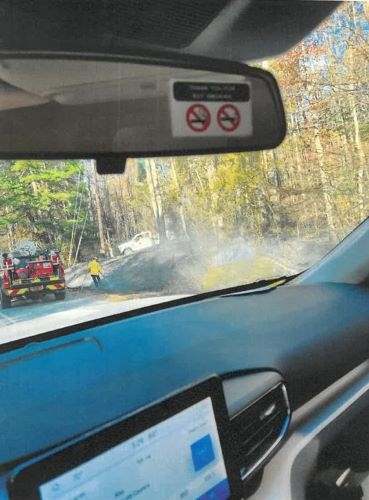Story co-produced with Tyler Elcock
“One word, horrific. It is a very hard thing to imagine that you may lose everything you own… In the end, we ended up losing an outbuilding and some trees on our property,” said medical assistant Stacy Morgan in an email message as she recalled her experience with the recent wildfires in Henderson County.

The Poplar Drive Fire in Henderson County was put out by Nov.19 and the site will continue to be monitored by N.C. Forest Service personnel. The fire footprint was 434 acres, and the cause was determined to be a debris burn and a person was charged for misdemeanor.
Morgan says event though the fire scared her and they ended up loosing an outbuilding and trees around the property the house was not damaged. And she learned. “It also taught us how to work together and truly work as a team with others to protect so many others,” Morgan said.
This fall the Western North Carolina had a lot more forest fires because of the dry weather. During November Jackson County had the East Fork Fire, started in Jackson County on Nov. 4 and kept burning 310 acres until the fire was 100% contained on Nov. 14. Luckily there were no structures that were damaged. The Collet Ridge fire in Cherokee County burned over 5,505 acres before it was contained. The Black Bear fire in Haywood County close to the I-40 is now 80% contained and burned around 1,888 acres.
These fires decreased the air quality around WCU to unhealthy red category and students could smell the smoke. Sara Duncan, assistant professor in WCU’s Environmental Health Program explained that Air Quality Index or AQI, in the red or ‘unhealthy’ category means “that everyone breathing outdoor air may experience negative health effects.”
In the story published on WCU website she explained that during periods of poor air quality from wildfire smoke, consider limiting time outdoors, especially if you are susceptible to air pollution due to asthma or other respiratory and even cardiovascular illness. Also, athletes and those who exercise outdoors should consider the impacts of intense outdoor physical activity on their short and long-term health.
WCU has its own air -quality network for anyone to check the air around the campus.
NC Forest Service Public Information Officer Philip Jackson said that this season they had over 900 fires. Most were smaller but some “taking out hundreds of acres of land. Jackson and other fire departments are encouraging people to always stay near the fire as well as to always have a phone, water, or even dirt to put the fire out.
While NC is an open burn state it may be a good idea to get a burn permit. Regardless of having a burn permit it is also good to check the weather and humidity levels before actually starting an open flame. If the area is more dry with lower humidity levels it may be better to either start a smaller fire and be very cautious of it or not start a fire at all.
UNC Health office manager Rochelle Britt still can’t sleep without thinking of the fire around her home and every time she smells burning she goes out. They didn’t lose anything but the thought of it was enough.
“We were lucky we were only displaced for one night. Now several of the families further down the mountain were displaced the whole time. One of the families just moved into their home 6 months ago and lost their home. The back of their house just melted,” Britt wrote in a message.
Check the current wildfire standings at the NC Forest Service website.



